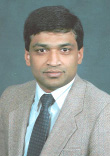The Seventh IASTED International Conference on
Wireless and Optical Communications
WOC 2007
May 30 – June 1, 2007
Montreal, Quebec, Canada
TUTORIAL SESSION
Sensor Networks - Technologies, Protocols, and Applications
Abstract
Objectives
Timeline
Tutorial Materials
Target Audience
Background Knowledge Expected of the Participants
Qualifications of the Instructor(s)

Anura Jayasumana is a Professor of Electrical and Computer Engineering at Colorado State University. He also holds a joint appointment in Computer Science. His areas of expertise include Computer and Communication Networks, Protocols, and Applications for Next Generation Internet, Optical Networks, and Sensor Networks. He has served as the PI of several DARPA, NSF, and industry funded projects on networking. He has served extensively as a consultant to industry, ranging from startups to Fortune 100 companies. He has supervised over 60 M.S. and Ph.D. theses, holds two patents, and is the co-author of a book and over 175 papers. He received his M.S. and Ph.D. degrees in Electrical Engineering from Michigan State University. At present, he is a member of the NSF Engineering Research Center for Collaborative and Adaptive Sensing of the Atmosphere (CASA) in the USA. With the "Virtual CHILL Radar (VCHILL)" project, funded by the DARPA Next Generation Internet (NGI) research initiative, his group developed and demonstrated protocol implementations to provide real-time access to the CSU (Colorado State University) CHILL Radar, a national radar facility used by numerous researchers throughout the USA. Professor Jayasumana is currently involved in a NSF supported project to network multiple radars in the front range of Colorado and Wyoming, making it possible to observe storms in real-time from multiple vantage points. His current research projects also include the development of a sensor network for underground chemical plume tracking.
References
| [1] |













